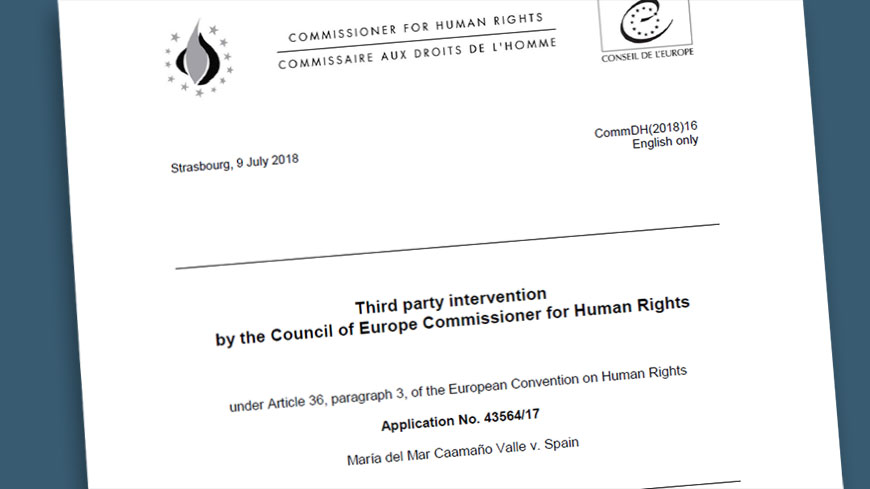Click here for the easy-to-read version
Dunja Mijatović, Council of Europe Commissioner for Human Rights, has intervened before the European Court of Human Rights on the right to vote of persons with disabilities. Her message was clear:
“No one should be deprived of their right to vote because of their disabilities. Persons with intellectual and psychosocial disabilities are no exception.”
Her intervention was referring to the case of a woman with intellectual disabilities whose right to vote had been withdrawn by a court in Spain and which at present is being heard at the Strasbourg court. While, thanks to pressure from organisations such as Inclusion Europe’s member Plena Inclusión, Spain committed to open the right to vote for all last year, the decision on the case could set a precedent. Certainly, the Commissioner’s intervention sends out a signal to all of Europe, where in many countries still restrict the right to vote of people with intellectual (and psychosocial) disabilities.
“In a modern democracy no one needs to justify why they vote for a particular party or candidate”
The intervention points to international agreements reaffirming the right to vote, such as the United Nations Convention on the Rights of Persons with Disabilities, as well as to recommendations of the Council of Europe’s Committee of Ministers and its Parliamentary Assembly. “Depriving persons of the right to vote on the basis of disability is contrary to these standards”, the Commissioner writes in the document, and adds that this includes cases where a judge makes an assessment of the person’s cognitive capacity or mental health status: “In a modern democracy no one needs to justify why they vote for a particular party or candidate.”
In the document, the Commissioner points out that withdrawing the right to vote from someone protects neither the person nor society, but rather maintains exclusion and stigma. It also deprives society from having its full diversity represented at elections. For people with intellectual disabilities, it takes away their chance of shaping the policies and measures directly affecting their lives.
Jyrki Pinomaa: “This right now must become a reality in every country in Europe”
The Commissioner explains that states must ensure people with intellectual and psychosocial disabilities can take part in elections, for example by making voting procedures more accessible and providing easy-to-read information about politics.
Welcoming the intervention, Inclusion Europe’s president Jyrki Pinomaa said: “People with intellectual disabilities should be fully recognised as citizens, which includes the unconditional right to vote and to stand for elections. This right now must become a reality in every country in Europe.”
Inclusion Europe will continue standing up for this goal alongside its members in future.
Read also: France opens the vote to all

Easy-to-read version
Click on a word which is in bold to read what it means.
“People with disabilities must have the right to vote”
Dunja Mijatović is the Commissioner for Human Rights
at the Council of Europe.
She has spoken to the European Court of Human Rights
about the right to vote for people with disabilities.
She said:
“Everybody has the right to vote.
That includes people with disabilities.”
Dunja Mijatović talked about the right to vote
because of something that has happened in Spain.
In Spain, a judge told a woman with intellectual disabilities
that she could not vote because of her disabilities.
The European Court of Human Rights
is now deciding if this was the best choice.
In Spain, many organisations said the choice was wrong.
One of these organisations was Plena Inclusión.
Plena Inclusión is a member of Inclusion Europe.
After what happened, Spain changed its law.
But many other countries in Europe still do not allow
some people with intellectual disabilities to vote.
What the Court decides is important for countries all over Europe.
No one should have to prove that they can vote
Many important texts say that
people with disabilities have the right to vote.
One of these texts is the UN CRPD.
Dunja Mijatović has said that these texts are more important
than the laws of a country.
She said that everybody must have the right to vote
because this is good for the whole community.
She said that people with intellectual disabilities
must have the chance to vote for people that care about their needs.
Dunja Mijatović has said that
every European country must make voting accessible.
She also said that information about politics must be easy-to-read.
Jyrki Pinomaa: “We need the right to vote for everybody
with an intellectual disability in every European country”
Jyrki Pinomaa is the president of Inclusion Europe.
Jyrki agrees with Dunja Mijatović.
He says:
“People with intellectual disabilities are people like everybody else.
They should have the same rights as everybody else.
This means in every European country they must have the right to vote.”
Inclusion Europe and its members
will continue to work for this.







